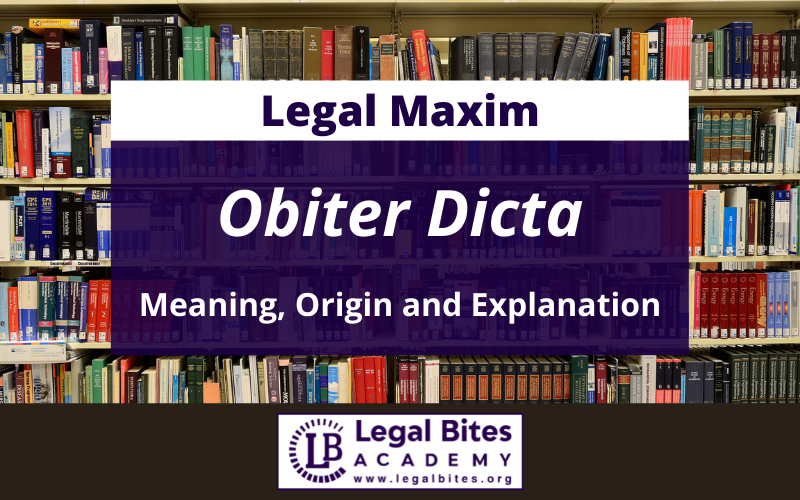Obiter Dicta: Origin, Meaning and Explanation
This article titled ‘Obiter Dicta: Origin, Meaning and Explanation’ is written by Sahajpreet Bhusari and discusses the concept of Obiter Dicta. I. Origin and Meaning Obiter Dicta is a legal maxim of Latin origin. In Latin, the maxim literally means ‘by the way’ and refers to the observations made by the judge.[1] II. Explanation The maxim refers to a… Read More »

This article titled ‘Obiter Dicta: Origin, Meaning and Explanation’ is written by Sahajpreet Bhusari and discusses the concept of Obiter Dicta. I. Origin and Meaning Obiter Dicta is a legal maxim of Latin origin. In Latin, the maxim literally means ‘by the way’ and refers to the observations made by the judge.[1] II. Explanation The maxim refers to a section of a judicial judgement that isn’t relevant to the court’s ruling in a particular case. Such utterances...
This article titled ‘Obiter Dicta: Origin, Meaning and Explanation’ is written by Sahajpreet Bhusari and discusses the concept of Obiter Dicta.
I. Origin and Meaning
Obiter Dicta is a legal maxim of Latin origin. In Latin, the maxim literally means ‘by the way’ and refers to the observations made by the judge.[1]
II. Explanation
The maxim refers to a section of a judicial judgement that isn’t relevant to the court’s ruling in a particular case. Such utterances may be noteworthy even if they lack the weight of precedent.
Obiter Dictum, in broad terms, is a judge’s incidental and collateral opinion that is not binding while considering a matter. It might be a judge’s passing remarks, opinions, or examples. Remarks on how the court arrived at its judgement, for example, are not binding, and this is what the phrase refers to. The main purpose of such comments is to clarify the legal principle that the judge intends to use in his or her decision.
III. Application
Judicial opinion consists of two parts, Ratio Decidendi and Obiter Dicta. Latin proverb, Ratio Decidendi deals with the interpretation of important/important facts and the law of the case, and it means is the “cause of the decision”. Obiter Dicta, on the other hand, are the judge’s additional observations, comments, and opinions on other matters expressed in determining the case. This supplement is provided to put the legal perspective into context.
IV. Illustration
If a court dismisses a case due to lack of jurisdiction and offers opinions on the merits of a case, then such opinions of the court constitute obiter dicta.
V. Case Laws
In Madhav Rao Jivaji Rao Scindia v. Union Of India[2], the Supreme Court of India, while stating the relevance of the obiter dicta, found it difficult to consider a word, clause or phrase in a judgment as an adequate statement of right even if it does not answer the direct question of the law of the case at hand.
We can therefore conclude by mentioning that the obiter dictum is an opinion that is not necessary for a judgment and is a position of law rendered by a judge in a case, but is not essential to his decision and is therefore not binding. It is the decisive ratio that has the binding force and the value of precedent.
References
[1] Obiter Dictum, Available Here.
[2] AIR 1971 SC 530.

